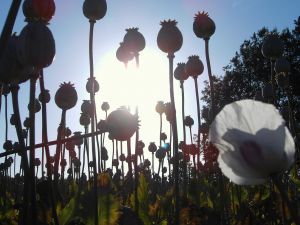
I heard a disturbing report on NPR this morning about how the Mexican drug war is now spreading into central America, particularly into the northern Peten region of Guatemala, which includes the site of the fantastic Mayan pyramids at Tikal. Guatemala draws fewer tourists in a year -- about a million -- than Yellowstone National Park can draw in a summer month. Here is a recent article from the Guatemala Times that describes Guatemala's efforts to draw more eco-tourists, a niche that Costa Rica has carved out to modest success.
As the NPR article points out, news of shoot outs between drug gangs, even if they are not directed toward tourists, is a sure way to drive tourists away. This removes much needed revenue from local people who could be leading tourists on jungle treks. Drug cartels are also "cutting clandestine airstrips in the Guatemalan jungle", which causes habitat fragmentation and ultimately species loss.
While I don't see an ad campaign that says "Cocaine: It's Killing the Planet" anytime soon, perhaps we in the US should recognize that our consumption of cocaine has far-reaching consequences from ruining individual lives at home to communities and environments not far away.
Here is an article about how cocaine cultivation has been ravaging the Columbian rainforest.





